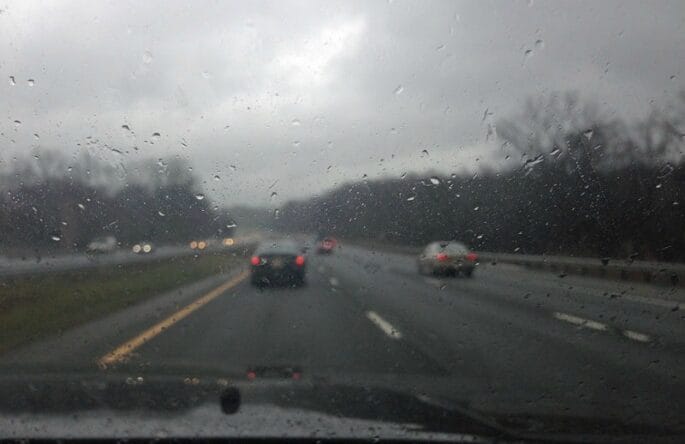Driving in the Rain – More Dangerous Than Snow?

Respect the rain!
Did you know that the majority of weather-related car crashes happen on wet pavement and while driving in the rain? According to data from the National Highway Traffic Safety Administration (NHTSA), 73% of weather-related car accidents happen on wet pavement, and 46% happen during rainfall. Surprisingly, a much smaller percentage of crashes occur during winter conditions: 17% during snow or sleet, 14% on snowy or slushy pavement, and 13% on icy pavement. According to AAA, wet pavement contributes to nearly 1.2 million car crashes per year.
The statistics don’t lie: drivers are more likely to stay home on a snowy day, but they don’t let rain stop them.
Slow and gentle wins the race on wet roads
Spring is upon us, and with that comes outdoor adventures, road trips, and… rain. When driving in the rain, remember two words: slow and gentle. Drive slowly. Apply gentle force to all actions such as steering and braking. Follow these tips:
- Slow down. This is the single most important way to reduce the chance of an accident.
- Turn on your lights.
- Leave more space between you and other cars. It will take longer to stop or slow down on a wet road.
- Avoid hard braking and turning sharply.
- Reduce distractions: Tell the kids to be quiet and turn the music down or off.
- Stay in the middle lanes where water is less likely to pool.
- Never drive through moving water!
- When winds gust, be acutely aware of larger vehicles on the road. They may have trouble staying in their lanes, and the spray from their large tires can further reduce your ability to see the road. Stay a safe distance away.
Hydroplaning
Hydroplaning is when your car’s tires are riding on a layer of water and have no contact with the actual road. In heavy rain, this is a concern. Hydroplaning can make steering and braking difficult and could even lead to losing control of your vehicle.
If you hydroplane, ease off the gas and apply light pressure to the brake. Don’t attempt to steer because when your tires make contact with the road again, you could end up steering yourself right off the road.
If the rain is exceptionally heavy and your vision is significantly obscured, it’s time to pull off the road. It’s best to find a rest stop or parking lot to wait out the downpour, but if you must stop on the roadside, pull off as far as possible and be sure to keep your hazard lights on to warn other drivers of your presence.

Hydroplaning can cause you to lose control of your car. Credit: Pixabay.com
Features that help on a rainy day
- Anti-lock brakes (ABS): Help prevent the loss of steering control during hard-braking
- Anti-skid control: Helps prevent front-wheel or rear-wheel skids when you are driving through a turn
- Lane-keeping assist: Helps you stay in your lane when visibility is reduced
Avoid using cruise control on wet roads, as it leaves you with less control of the car. Ultimately, you want complete control over the car during any type of adverse weather conditions.
How to prepare your car for driving in the rain
- Make sure your windshield wipers are in good working condition and don’t leave streaks.
- Check that all headlights, taillights and brake lights function properly.
- Check tire tread depth and inflation. A quick way to check your tread depth is to insert a quarter upside down into your tire tread. If part of Washington’s head is covered by the tread, your tires have more than 4/32 of an inch of tread remaining. If the top of Washington’s head is exposed at any point, you should consider replacing your tires.
With the rainy season coming up, use these tips to stay safe and treat wet roads with as much respect as snowy and icy roads.
